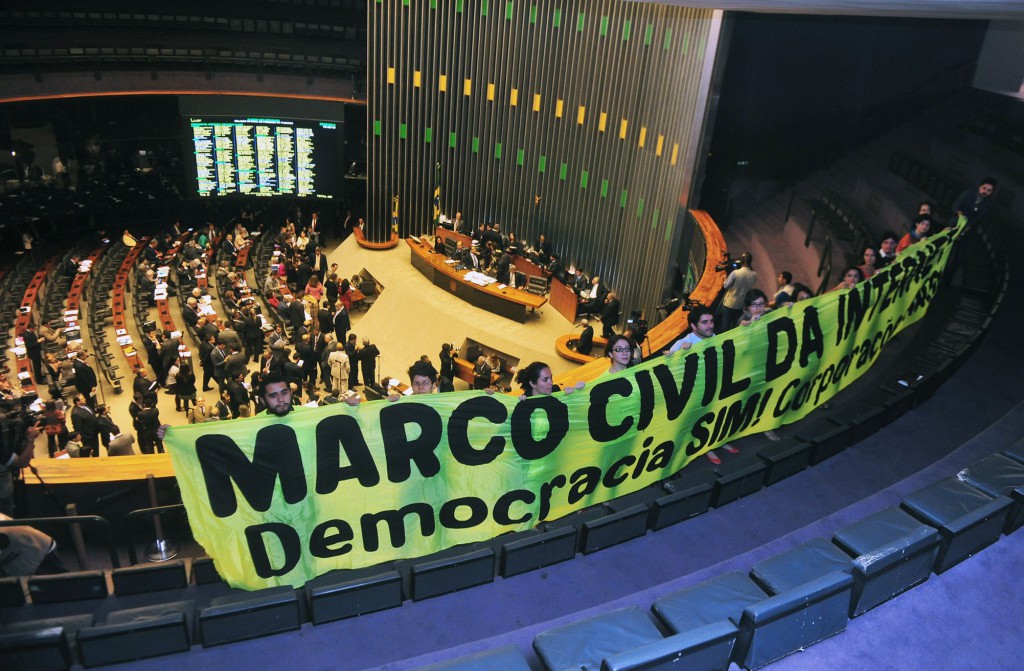Draft Bill 215/2015, infanticide to the newly-born digital rights in Brazil
by Digital Rights LAC on October 27, 2015
Still fresh in the memory of all Brazilians as well as all the internet governance community, is the scene where President Dilma Rousseff signed law 12.965/2014 on April 23rd of 2014 at the stage of NetMundial. Most commonly known as Marco Civil/MCI, the law was a reactionary move against Internet-regulation proposals based on a criminal perspective and gained strength in 2007.
Por Bruno Ricardo Bioni*
Instead of betting in a regulatory dynamic that would slow social participation in the net through punishment-based lenses grounded on criminal law, upholding users’ rights and guarantees as an incentive were the chosen path.
Beyond its normative content, the MCI was also singular due to its formulation process. Engaging with the society culminated in its famous collaborative process – the elaboration of an online platform, widely accessed and diffused throughout society. It took seven years between the articulation and elaboration of the MCI and its approval at the national congress; now with more than one year, this successful and internationally applauded experience of the Internet Bill of Rights faces a great threat.
An agenda revoking the important chapter on national democracy is now circulating within the Congress. Already approved in the Chamber of Deputies’ Commission on Constitution, Justice and Citizenship, the draft bill 215/2015 meets/goes against with the history of the MCI and its regulatory pillars by proposing changes in some of its apparatuses.
First, the punitive discourse is reclaimed as a regulatory strategy. This legislative initiative supports a questionable criminal policy for crimes/offenses against honor, and seeks to make it stricter by increasing punishments for such crimes (when practiced through/in the Internet). In practice, this punitive regulatory framework could collaterally damage freedom of expression, provoking hindering critical opinions that could attract those types of crimes against honor, whose penalties oscillations are an unstimulating additional factor for the free manifestation of this nature. International documents and recommendations point that illicit acts such as these should be transferred to civil affairs.
Second, the bill draft foresees a limited reading of the “right to be forgotten” – it is stretched/widened in comparison to the original conception of the term. With that being so, it does not provide the disindexation of contents, only its total escheat/unavailability, and most importantly, it disregards criteria for its well-balanced enforcement.
The right to be forgotten always involved a case-by-case examination regarding information so it would not supress the right to information. Nonetheless, this legal initiative runs over this debate when it establishes a criteria for the assumed offense against honor. Therefore, it does not include other standards, such as the historical and public values of information as an exception to the right to be forgotten.
Due to such individualistic and simplistic rationality, a corrupt politician could claim that honor-offensive information against him/her should be “forgotten”, inarguably influenced by his/her public interest. Protecting honor is, once more, overstretched in view of the lack of criteria capable of emulating the protection honor vis à vis the freedom of expression and access to information, what could ultimately determine the maintenance/availability of a certain content in the Internet.
Third, and last, the draft bill extends the definition of data required for registration foreseen in the MCI – what stands as an exception to the rule that prescribes a compulsory court order to access such data. Besides personal qualification, address and affiliation, such hypothesis overreaches phone numbers, national registration number and email, demanding that all application Internet service providers collect such data. In practice, registration becomes a necessary condition for users to surf the Internet. Such intrusion was, within other motives, the reason for this draft bill to be nicknamed “PL Espião” (Spy Draft Bill).
The most troubling part is, it does not consider the pending regulation of the MCI, through presidential decree, that will detail this regime of exception to access personal data without court order. Similarly to the process of elaboration, the regulation of MCI has been submitted to public consultations. Its contributions aimed – antagonistically to what was proposed by “PL Espião” – in bringing greater guarantees to users’ privacy, therefore defining the limits to additional measures for requiring and holding data. Most worrisome is noting that the MCI is only in its first year, pending a presidential decree to produce all of its regulatory impact.
Even so, the Brazilian legislative arm intends to modify this judicial architecture, proposing in contradiction to its regulatory pillars, such as the liberty of expression, access to information and privacy. The civic product of the Brazilian society that was cultivated for seven years and recently completed its first anniversary could have its history shortened. Civil society, academia and CGI (Comitê Gestor da Internet) have already mobilized themselves against this infanticide. Past, present and future of Internet regulation get mixed up, putting at risk the new-born digital right in Brazil.
*Lawyer and researcher at the Public Politics Group for Information Access, São Paulo University (Surveillance and Privacy Research Project).






